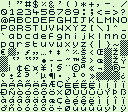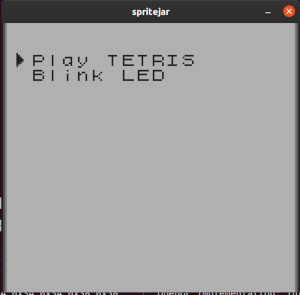A small command line utility to convert PNG images
to GBDK or RGBDS
compliant Game Boy tiles. Tiles are generated as C unsigned char arrays for
GBDK tiles, and an array of byte literals in ROM for RGBDS tiles.
Takes input like:
That you can use in your Game Boy programs like:
Install cargo, and rust
cargo install gbtile
$ git clone [email protected]:blakesmith/gbtile.git
$ cd gbtile/
$ cargo install --path .
The gbtile executable will be installed in $HOME/.cargo/bin/ by default.
If you use the nix package manager, from the root of this repo, with flakes enabled:
$ nix build
You can also depend on it from another repo via the flake directly.
The gbtile executable will be in result/bin/gbtile.
USAGE:
gbtile [FLAGS] [OPTIONS] -i <input> -o <output>
FLAGS:
-d Enable debug logging
-h, --help Prints help information
-V, --version Prints version information
OPTIONS:
-i <input> The PNG image to generate tiles from. Example: 'image.png'
-o <output> The output file to generate. Usually something like 'tiles.h' for GBDK output, or
'tiles.asm' for RGBDS
-t <output-type> The output type. Either 'gbdk' or 'rgbds'. Defaults to 'gbdk'
Find an image that matches the image criteria below, or make your own in your favorite photo editor, then convert it like so:
$ gbtile -t gbdk -i ascii.png -o ascii.tile.h
2020-05-19 21:07:02,154 INFO [gbtile] File: ascii.png, Tile rows: 14,
columns: 16, unique colors: 2
Make sure the tile count and unique colors match your expectations. The output will be a valid C array like so:
unsigned char ascii[] = {
0x00,0x00,0x00,0x00,0x00,0x00,0x00,0x00,0x00,0x00,0x00,0x00,0x00,0x00,0x00,0x00,
0x00,0x00,0x40,0x40,0x40,0x40,0x40,0x40,0x40,0x40,0x00,0x00,0x40,0x40,0x00,0x00,
...
0x10,0x10,0x38,0x38,0x54,0x54,0x50,0x50,0x38,0x38,0x14,0x14,0x54,0x54,0x38,0x38,
};The variable name should match the input file name.
You can now include the tile array in your GBDK Game Boy projects, and
load it using the set_bkg_data or set_sprite_data C functions.
$ gbtile -t rgbds -i ascii.png -o tiles.asm
2023-03-19 08:29:04,797 INFO [gbtile] File: img/ascii.png, Tile rows: 14, columns: 16, unique colors: 2
The label name of the tiles will match the file name, will be placed in ROM, and exported for other .asm files to reference.
You'll get an output file that looks something like this:
SECTION "Tiles for 'ascii'", ROM0
EXPORT ascii, ascii_end
ascii:
db $00,$00,$00,$00,$00,$00,$00,$00,$00,$00,$00,$00,$00,$00,$00,$00,
db $00,$00,$40,$40,$40,$40,$40,$40,$40,$40,$00,$00,$40,$40,$00,$00,
db $00,$00,$6c,$6c,$24,$24,$48,$48,$00,$00,$00,$00,$00,$00,$00,$00,
db $00,$00,$24,$24,$7e,$7e,$24,$24,$24,$24,$7e,$7e,$24,$24,$00,$00,
...
db $00,$00,$28,$28,$00,$00,$44,$44,$44,$44,$28,$28,$10,$10,$60,$60
ascii_end:You can assemble the file along with the rest of your project with something like:
rgbasm -L -o tiles.o tiles.asm
Once the tile data is assembled with the rest of you're project, you'll need to copy
the tiles into video memory correctly using some sort of Memcopy routine like so:
; Called at game startup
InitGame:
; Call routine to initialize tile data
call InitTileData
; Jump to main game loop after initializing tile data
jp Main
; Initialize the tile data. In this example, we've converted a tile image
; named 'ascii_tiles' from gbtile, so we should have two symbols exported
; for our project to use: 'ascii_files' and 'ascii_tiles_end', which should reference
; to the beginning and end address of the tile data in ROM.
InitTileData:
; Copy tile data from the exported tile named 'ascii_tiles'
ld de, ascii_tiles
; Load the tiles into the start of video memory address
ld hl, $9000
; The length of the copy is the difference between the start
; of the ascii_tiles symbol, and ascii_tiles_end symbol.
ld bc, ascii_tiles_end - ascii_tiles
call Memcopy
ret
; Copy bytes from one area to another.
; @param de: Source
; @param hl: Destination
; @param bc: Length
Memcopy:
ld a, [de]
ld [hli], a
inc de
dec bc
ld a, b
or a, c
jp nz, Memcopy
retFor my workflow, I'm using the following image setup:
- Create an image that has a pixel dimension that's divisible by 8, and no greater than 256x256
- Use 4 distinct colors. 0xFFFFFF for white, 0x000000 for black. Dark gray, any RGB value between 0xbfbfbf and 0x7f7f7f. For light gray, any RGB color between 0x7f7f7f and 0x3f3f3f.
- The image will be cut into tiles that are 8x8 pixels wide each.
- I've been using RGB formatted PNGs, but others should theoretically work.
MIT Licensed.

